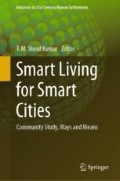Abstract
The following chapter tries to pay attention to the spatial dimension of smart living projects in India. Geospatial Planning is a comparatively new terminology in the spatial planning dictionary of the Indian urban scenario, just like the terms smart planning and smart cities are. Although there is no clear delineation between smart living and smart city projects in India, characteristics of the Smart Cities Mission are in consonance with the ideologies of smart living. The chapter first tries to understand the key values underpinning the concept of smart living and delineates it through the terms interconnectedness, sustainability and mobility (both social and physical in nature). It tries to then identify how geospatial tools help manifest these values of smart living and an elaborate network of indicators is identified. This network of indicators lays the foundation for evaluating geospatial smart living projects in New Delhi.
Access this chapter
Tax calculation will be finalised at checkout
Purchases are for personal use only
References
Ajwaliya RJ, Patel S (2014) Design and development of GIS based utility management system at DOS Housing Colony, Vikramnagar, Ahmedabad. Int J Eng Res Appl 56–73
Banerjee A (2018) A geospatial information approach to planning for rurban clusters. Unpublished Bachelor’s Thesis, 31 July 2018. Department of Physical Planning, School of Planning and Architecture, New Delhi, Delhi, India
Batagan L (2011) Smart cities and sustainability models. Inform Econ 15(3):80–88
Begwani C (2018) Evaluation of area based projects under smart cities mission—a case study of the NDMC smart city. Unpublished Bachelor’s Thesis Report. Department of Physical Planning, School of Planning and Architecture, New Delhi, India
Benevolo C, Dameri RP, D’Auria B (nd) Smart mobility in smart city: action taxonomy, ICT intensity and public benefits. Draft Version
Bills TC (2013, July 161-4) Transportation: GIS for intelligent transportation systems
Center for Study of Science, Technology and Policy (CSTEP) (2015) Reconceptualising smart cities: A reference framework for India. Presentation, India International Center: https://niti.gov.in/writereaddata/files/document_publication/CSTEP%20Report%20Smart%20Cities%20Framework.pdf
Daniel S, Doran M-A.(2013) geoSmartCity: geomatics contribution to the Smart City. In: The proceedings of the 14th annual international conference on digital governance research, Quebec City, Quebec, Canada, pp 65–71
Dhade M (2017) Smart Mobility: A tool for smart and sustainable city. Retrieved from Geospatial World, 25 Mar 2017
ESRI (2011) GIS best practices: sustainable development. ESRI
Garau C, Pavan VM (2018) Evaluating urban quality: indicators and assessment tools for smart sustainable cities. Sustainability 10(575):1–18
Gupta AK, Kumar P, Sharma KP (2017) Development of geospatial map based portal for New Delhi Municipal Council. In: The international archives of the photogrammetry, remote sensing and spatial information sciences, ISPRS Geospatial Week, vol XLII-2/W7. Wuhan, China
Harrison C, Donnelly IA (2011) A theory of smart cities. In: Proceedings of the 55th Annual Meeting of the ISSS. Hull, UK. Vol 55:1
IBM (nd) Smarter cities. Retrieved 28 Dec 2019, from Smarter Planet: https://www.ibm.com/smarterplanet/us/en/smarter_cities/overview/
Khan S, Taraporevala P, Zerah M-H (2018) Defining Indian Smart Cities Mission Impossible. Econ Political Wkly 53:49
Lombardi P, Giordano S, Farouh HA (2011) An analytical network model for smart cities. In: Proceedings of the international symposium on the Anaytic hierarchy process, pp 1–6
Malik M, Singh DP, Sharma DA (2011) GIS and RS for sustainable development integrating with data clustering techniques. In: 5th IEEE international conference on advanced computing & communication technologies, pp 291–296
Meyers JR (nd) GIS in the utilities. Retrieved 2019, from GIS Book (Abridged): https://www.geos.ed.ac.uk/~gisteac/gis_book_abridged/files/ch57.pdf
Mitchell WJ (nd) Smart cities: group information. Retrieved 28 Dec 2019, from MIT Media Labs: https://smartcities.media.mit.edu/frameset.html
MJ N (2012) GIS-based environmental and ecological planning for sustainable development. Geospatial World, 16 Jan 2012
New Delhi Municipal Council (2015) Smart city proposal: developed for round 1—stage 2 of smart city challenge, Dec 2015. Retrieved 31 Dec 2019, from Mygov.in: https://blog.mygov.in/wp-content/uploads/2015/12/Smart-City-Delhi_v3.pdf
NIUA (nd) NDMC projects. Retrieved 25 Dec 2019, from smartnet.niua: https://smartnet.niua.org/sites/default/files/resources/NDMC_projects.pdf
OiER; UN Economic Commission for Europe; Graz. (2014) The smart city conference for sustainable cities. In: Conference review. Urban Future Global Conference, Graz, p 10
Prasad K, Vasanthakumar N, Singh S (2016) Delhi gears up to be a ‘smart city’, 3 Sept 2016. Retrieved 29 Dec 2019, from Geospatial World: https://www.geospatialworld.net/article/delhi-gears-up-to-be-a-smart-city/
PricewaterhouseCoopers (2014) Delhi state spatial data infrastructures (DSSDI). Case Study. Department of Information Technology, Government of NCT of Delhi, 6 May 2014
Probst L, Monfardini E, Frideres L, Cedola D, PwC (2014) Smart living: smart construction products and processes. Best Innovation Observatory, European Commission, European Union, Luxemborg
The Subnational Estimates Working Group of the HIV Modelling Consortium. Evaluation of geospatial methods to generate subnational HIV prevalence estimates for local level planning. Imperial College London, London
Tiwari A, Jain K (2014) GIS steering smart future for smart cities. Int J Sci Res Publ 4(8):1–6
Tranos E, Gertner D (2012) Smart networked cities? Innov Eur J Soc Sci Res 25(2):175–190
Author information
Authors and Affiliations
Corresponding author
Editor information
Editors and Affiliations
Rights and permissions
Copyright information
© 2020 Springer Nature Singapore Pte Ltd.
About this chapter
Cite this chapter
Lata, K., Kumar, P., Banerjee, A. (2020). Geospatial Intelligence for Smart Living–Case of New Delhi. In: Vinod Kumar, T. (eds) Smart Living for Smart Cities. Advances in 21st Century Human Settlements. Springer, Singapore. https://doi.org/10.1007/978-981-15-4603-7_4
Download citation
DOI: https://doi.org/10.1007/978-981-15-4603-7_4
Published:
Publisher Name: Springer, Singapore
Print ISBN: 978-981-15-4602-0
Online ISBN: 978-981-15-4603-7
eBook Packages: Earth and Environmental ScienceEarth and Environmental Science (R0)

